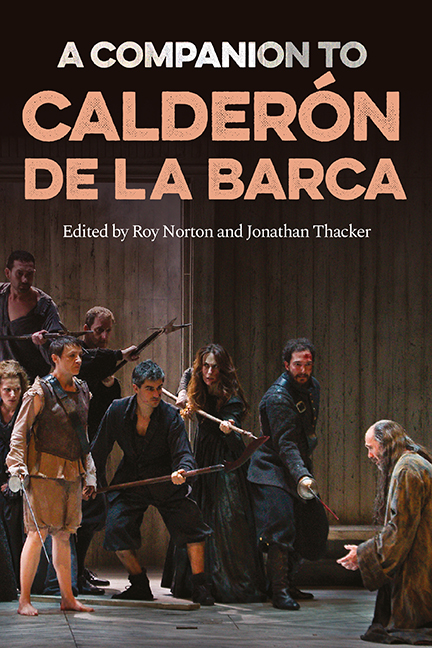Book contents
- Frontmatter
- Dedication
- Contents
- List of Illustrations
- List of Contributors
- Acknowledgements
- List of Abbreviations
- Introduction
- 1 Biography and Context
- 2 The Calderonian World
- 3 The Playwright’s Craft: Calderón and the Great Theatrical World of Early Modern Spain
- 4 La vida es sueño
- 5 The Honour Plays of Calderón
- 6 Calderón, the Comedian
- 7 Mythological Court Spectacle Plays
- 8 Religious comedias
- 9 Calderón’s ‘Sacramental, Allegorical and Historical’ autos
- 10 Calderón’s graciosos
- 11 Calderón and Visual Art
- 12 The Staging of Calderón’s Theatre
- 13 Calderón’s European Reception from Romanticism to the Twentieth Century
- 14 The Reception of Calderón in the Hispanic World
- Appendices
- Consolidated Bibliography
- Index
- Tamesis • Companions
13 - Calderón’s European Reception from Romanticism to the Twentieth Century
Published online by Cambridge University Press: 07 October 2022
- Frontmatter
- Dedication
- Contents
- List of Illustrations
- List of Contributors
- Acknowledgements
- List of Abbreviations
- Introduction
- 1 Biography and Context
- 2 The Calderonian World
- 3 The Playwright’s Craft: Calderón and the Great Theatrical World of Early Modern Spain
- 4 La vida es sueño
- 5 The Honour Plays of Calderón
- 6 Calderón, the Comedian
- 7 Mythological Court Spectacle Plays
- 8 Religious comedias
- 9 Calderón’s ‘Sacramental, Allegorical and Historical’ autos
- 10 Calderón’s graciosos
- 11 Calderón and Visual Art
- 12 The Staging of Calderón’s Theatre
- 13 Calderón’s European Reception from Romanticism to the Twentieth Century
- 14 The Reception of Calderón in the Hispanic World
- Appendices
- Consolidated Bibliography
- Index
- Tamesis • Companions
Summary
The reception of Calderón outside Spain is governed by a paradox. His most markedly Catholic plays, notably La devoción de la cruz [Devotion to the Cross] and El purgatorio de San Patricio [St Patrick's Purgatory], have often repelled readers from a Protestant background by their apparent subservience to superstition and by their morality whereby, as in these two plays, multiple crimes can be expiated by deathbed repentance. The Genevan historian Sismondi (1773–1842) said that Calderón was ‘the true poet of the Inquisition’. Such judgements may look dated and narrow, now that twentieth-century techniques of interpretation have made possible much more nuanced readings of Calderón. Yet, strangely, these very plays called forth the greatest enthusiasm and the most creative response in Goethe and Shelley, two writers with small sympathy for Christianity.
The significant reception of Calderón really begins with Romanticism. In the preceding century and a half, versions of his plays were often performed in France, Germany, the Netherlands and England, so that it can fairly be said that ‘stage adaptations of Calderón in the eighteenth century had made him better known than Shakespeare’. But such a statement is also misleading. For the Calderón familiar to pre-Romantic audiences was not the acknowledged classic we know today, but principally the author of comedies; and in an age when authorial copyright was unheard of, his comedies were freely adapted and cannibalised for the popular stage. Plays in other categories were occasionally performed. In the Spanish Netherlands, the obvious route by which Calderón's work was disseminated to northern Europe, a Dutch translation of La gran Cenobia [The Great Zenobia] was performed in 1667. Some eleven performances of La vida es sueño [Life is a Dream] are recorded between 1654 and 1760 in Germany, where theatre was still mostly in the hands of itinerant troupes; it was also adapted as a libretto for the Hamburg opera in 1693 (Sullivan, Calderón, pp. 80, 88–90). The most popular of Calderón's plays in late seventeenth-and early eighteenth-century Germany, however, appears to have been Lances de amor y fortuna [Accidents of Love and Fortune]: it was performed five times by the well-known troupe led by Johannes Velten, and eleven further references to it between 1666 and 1734 have been found (Sullivan, Calderón, p. 77).
- Type
- Chapter
- Information
- A Companion to Calderón de la Barca , pp. 284 - 299Publisher: Boydell & BrewerPrint publication year: 2021



